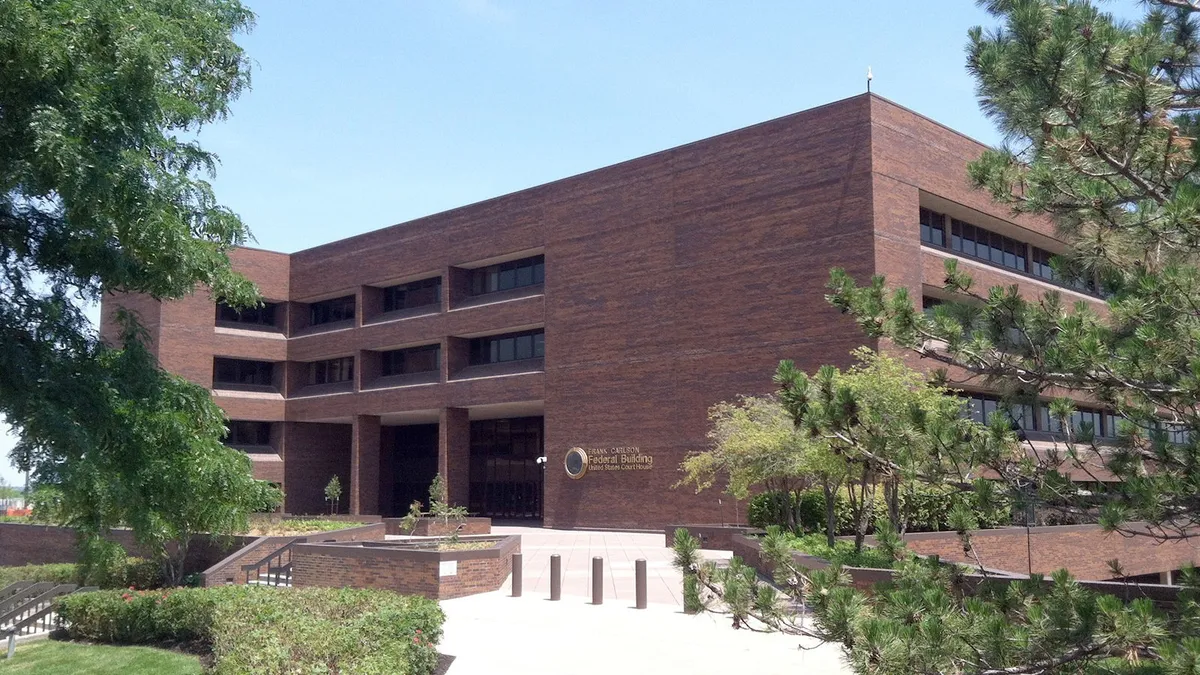Dive Brief:
- The U.S. Department of Education will be prohibited from enforcing its new Title IX rule in over 1,100 schools and universities, including those in liberal-leaning states that have not filed lawsuits against the department or its rule protecting LGBTQ+ students, according to court documents filed Monday.
- The list of schools to be exempt from the Title IX rule is the result of a lawsuit filed in U.S. District Court for the District of Kansas in Topeka by advocacy groups and conservative states. The lawsuit resulted in a preliminary injunction earlier this month, in which Judge John Broomes requested the list of schools from the plaintiffs.
- Young America's Foundation, Females Athletes United, and Moms for Liberty named more than 400 K-12 schools and 600 higher education institutions attended by their members or their members' children that are to be excluded from the Aug. 1 implementation date, including many in liberal-leaning states like California, New Jersey and New York.
Dive Insight:
The extensive list filed by the plaintiffs seeking to block the Title IX rule in specific schools is a drastic change in approach from other lawsuits that have led to the rule being temporarily banned from taking effect in 15 conservative states.
In addition to statewide blocks, the new Title IX rule will also be halted in schools within districts and states that otherwise have to be in compliance with the rule. Broomes hasn't formally signed off on the list or identified any qualifiers for which schools and institutions would be affected.
The statewide blocks have created instability and confusion for school districts, say Title IX lawyers. Now, school-specific injunctions complicate issues even further.
"It's not limited to states that already have an injunction, or even states that have filed litigation against Title IX," said Kayleigh Baker, a member of the Association of Title IX Administrators' advisory board. As a Title IX lawyer, Baker works with universities and school districts in North Carolina, Pennsylvania, California, and other states where some of the listed schools are located.
"This is really uncharted territory when it comes to Title IX regulations,” Baker said. “It's really coming school-by-school."
Decisions from the courts to block the rule in select states — and now specific schools — come as the regulation’s Aug. 1 implementation date approaches.
While the U.S. Department of Education has said it stands by its rule and the rulemaking process it underwent, the agency has not released guidance for school districts in states where the rule will no longer be in effect.
It has, however, filed motions in three of the cases that led to injunctions, hoping to keep parts of the 2024 rule in place. Those requests have been denied in two cases so far — those led by Louisiana and Tennessee.
The department also intends to escalate lawsuits against the rule to the 5th, 6th and 10th U.S. Circuit Courts of Appeals, challenging the blocks currently in place on the rule, according to recent court documents.
In the meantime, however, Title IX lawyers say districts have been left in the lurch.
"I'm sort of at the point now where I'm like, ‘Could somebody just issue a nationwide injunction please?’" said Jackie Gharapour Wernz, an education civil rights consultant for Education Civil Rights Solutions, which provides compliance trainings for Title IX. Wernz previously served as a civil rights attorney for the U.S. Department of Education's Office for Civil Rights under the Obama and Trump administrations. "But no. For some reason, nobody wants to do that."
















